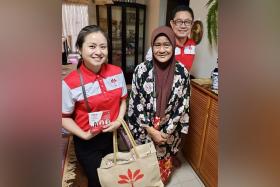WP “unable” to support GST hike: Pritam Singh
WP's Pritam Singh says party 'unable' to support new GST
The Workers' Party (WP) is "unable" to support the recently announced increase of the goods and services tax (GST), announced the assistant secretary-general of WP Pritam Singh during the Budget debate in Parliament yesterday.
On Feb 19, Singapore's Finance Minister Heng Swee Keat announced in Budget 2018 that the GST will be raised for the first time in more than a decade, from 7 per cent to 9 per cent, and that the hike will be implemented some time from 2021 to 2025.
Mr Singh, who is an Aljunied GRC MP and tipped to be the party's next leader, told the House that instead of raising GST, the Government could consider the "novel" idea of tapping into money raised from land sales.
Currently, money earned from land sales are excluded from spending because they form part of Singapore's reserves - a move that prevents the unnecessary selling of land to meet expenditure needs, which could ramp up property prices.
Acknowledging this, Mr Singh suggested putting a cap on the amount of earnings from land sales that could be used for spending.
A figure he gave was "not more than 20 per cent of the value of average land sales over 20 years, or 20 per cent of land sales for that year, whichever is lower".
"This would give no good reason for an ill-advised government to ramp up land sales when in government to increase its own income," added Mr Singh.
Later, MP Lim Biow Chuan (Mountbatten SMC) opposed Mr Singh's suggestion to include land sales in Government spending.
Said Mr Lim: "Once the land is sold, the asset is gone."
WP chairman and fellow Aljunied GRC MP Sylvia Lim asked Mr Lim to clarify and suggested that land here is sold on leasehold terms and that it will eventually revert to the state.
In response, Mr Lim said land is sold on 99-year leases, meaning that after a sale, a land parcel can be sold again only after the lease expires in 99 years.
Part of the income from land sales invested as part of the reserves is now already able to be spent through the Net Investment Returns Contribution framework, which allows the spending of up to half of the returns from investing the reserves.
In response to this, Mr Singh said that separating land sales income from the other reserves for investment avoids "co-mingling" - allowing for "greater transparency" and guarding against "consequences of poor investment decisions".
Mr Singh also said that it is unclear how the Government plans to spend its future Budget when the GST goes up.
This "lack of clarity" and insufficient information regarding the potential to tap on the reserves has made the WP "unable" to support the increase in GST, according to him.
Said Mr Singh: "GST may well have to rise, but Singaporeans could be more likely to accept it if the Government considers the pros and cons of moving from the establishing orthodoxy and considers new approaches that improve social protection thresholds for all."
Get The New Paper on your phone with the free TNP app. Download from the Apple App Store or Google Play Store now



